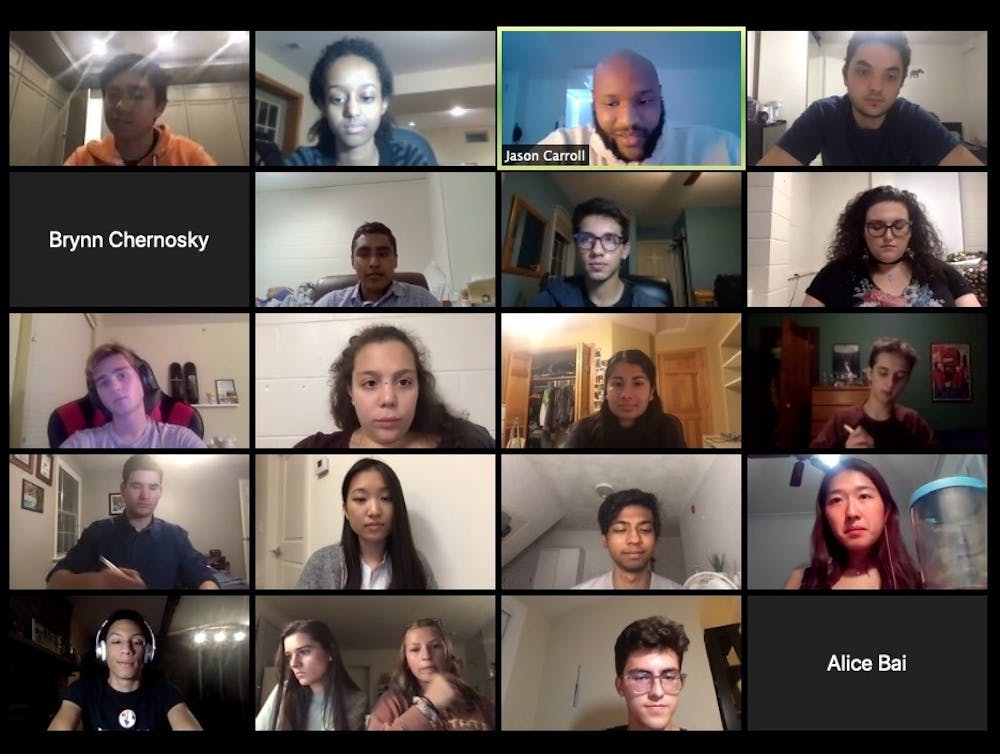After opening a vote for the Undergraduate Council of Students treasurer and UCS/Undergraduate Finance Board liaison position at its general body meeting Wednesday evening, UCS announced in a follow-up email that it will conduct a revote after students who were not at the virtual meeting voted in the internal elections.
“Anyone voting must have watched the candidates’ speeches. Due to these irregularities, while we originally intended to open voting to asynchronous members, we will no longer be able to do so,” wrote UCS President Jason Carroll ’21, Vice President Summer Dai ’22 and Chief of Staff Sam Caplan ’22 in an email following Wednesday’s meeting.
Eligible voters include students who signed in to the general body meeting or were “otherwise verifiably at the meeting.”
“If we obtain evidence of anyone, especially candidates, attempting to share the voting form after this point, we will take appropriate action, including punitive measures,” Carroll, Dai and Caplan wrote. The voting period will close at the end of the day Thursday.
At the meeting, the Council also introduced two constitutional amendments. The first enumerated changes to election logistics for first-year representatives, allowing elections to occur in October rather than September, while the second proposed the introduction of class year representatives for every grade level akin to the current first year representative positions. Both amendments will be voted upon at next week’s general body meeting.
In the race for treasurer, Hari Dandapani ’23 ran against Elli Lee ’22, and for UCS/UFB Liaison, Ricky Zhong ’23 ran against William Borges ’24. Candidates were given two minutes to speak, followed by five minutes each for questions. The votes were initially tallied via a Google form, unlike the raised-hand form of voting typically employed by UCS.
Before candidates gave their speeches, UFB Chair Akilesh Raman ’22 and UFB Vice Chair Anika Ahluwalia ’23 spoke about UFB’s role on campus and its interactions with UCS.
“We allocate the $2.2 million that we have among more than 200 student clubs on campus by reviewing budgets from different clubs,” Raman said, emphasizing the Board’s support for diversity among student groups and their activities. Ahluwalia added that the Board’s bi-weekly policy meetings will take on even more importance this semester given UFB’s changed operations in light of the pandemic and its continued effects.
Dai also briefly detailed the responsibilities of the treasurer role, in which she previously served.
In his speech for treasurer, Dandapani focused on his promise to support student groups that highlight global cultures, inclusion and diversity, as well as volunteer and outreach groups.
“Brown is a member of the Providence community, and it is very important that we involve ourselves in it to support this community that has given us so much,” he said. Dandapani also expressed his desire to encourage clubs to support local businesses, many of which have been financially devastated by the COVID-19 pandemic, through their spending.
In her speech, Lee highlighted UCS’ obligation to address and try to mitigate the socioeconomic disparities that she says have been exacerbated by remote learning. She cited her experience last year serving on the Council’s Health and Wellness committee as an impetus for her to seek the treasurer position.
“Because so many students are feeling the distance between them and campus, student clubs are critical to sustaining a sense of community,” she said.
For UCS/UFB liaison, Zhong’s speech focused on his extensive involvement with UCS and subsequent desire to explore the intersection between the Council and UFB. He noted his experience categorizing and sorting student groups as part of the Student Activities Committee as well as his desire to see more equitable funding allocated to service groups as his motivations for running. “As someone who is in multiple service groups, sometimes we lack funding and materials to help others,” he said.
Borges, in his speech, highlighted the importance of transparency and accountability in student group funding, comparing the equitable funding efforts of other universities with Brown’s student group funding policies. He also noted his communication skills as an asset for the position.

ADVERTISEMENT




